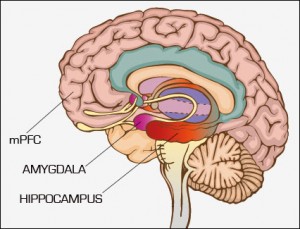Numerous studies in recent years show that people who meditated for about 30 minutes a day, for Eight weeks had measurable changes in gray-matter density in parts of the brain associated with memory, sense of self, empathy, and stress.
In fact, the human brain is exactly like a muscle and can be trained in a very positive manner, which impacts our growth and enhances our performance.
Meditation is the most powerful way to activate this stimulus by strengthening the prefrontal cortex, the area of the brain responsible for decision-making, executive functioning, and judgment.
During meditation, we are constantly bringing our attention back to the present moment. Each time the mind wanders and is intentionally brought back into the present, the prefrontal cortex is strengthened.
Studies show that practitioners who experienced lower levels of stress also showed decreased gray-matter density in the amygdala, which is known to play an important role in anxiety and stress.
Brain scans of meditators showed increased gray-matter density in the hippocampus, the region responsible for learning and memory, and in structures tied to self-awareness, compassion, and introspection.
It is amazing to see the brain’s plasticity, and that by practicing meditation; we can actually change the brain structure, and can increase our well-being and quality of life. Over time, meditation has been shown to greatly improve willpower, creativity, and concentration.
Our emotions are continuously changing. Difficult emotions like anger, fear, worry, and stress actually release chemicals in our brain that prevent us from learning and can make us react and say and do things we didn’t want to. Our regular meditation practice stops these chemicals.
As human beings, we have been accustomed to allow our minds to run without control, not giving it any break to relax and regain energy.
Do you recall when was the last time that you give your mind a break; to sit quiet and still, to relax and release all tensions and stress of daily life? Thoughts about the past plans about future, the next meeting to attend and deadlines have to be met.
When we practice mindfulness we give our mind a break to become still and regain energy. In this break we allow our mind to be aware of its thoughts and emotions, we look at our feelings as they arise at the moment. Accept them as they are, even if they are strong emotions, like anger, sadness, helplessness, jealousy, and so on …., we just notice them non-judgmentally, and bring our awareness back to the breath, therefore we strengthen the area of the brain responsible for decision making and executive functioning, each time we come back to present moment during our meditation practice.
Namaste!
Gita Nilforoush
published: March 7, 2016
For more information regarding mindfulness studies check Harvard gazette here:
http://news.harvard.edu/gazette/story/2012/11/meditations-positive-residual-effects/
Contact us today to book your free online meditation session: info@meditationforallages.com


